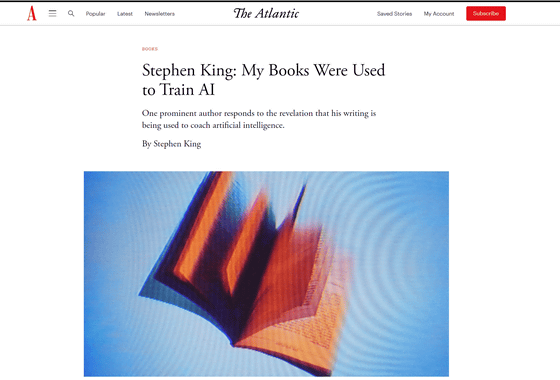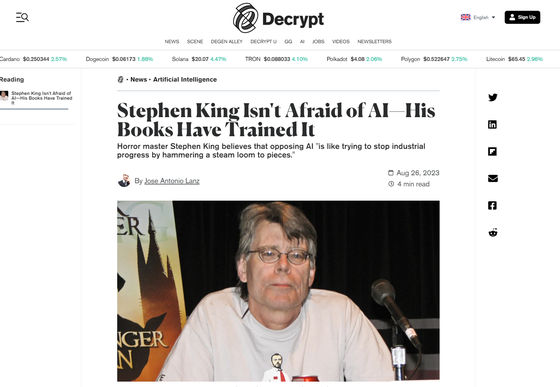After analyzing the AI training model, about 200,000 titles were identified, including books by thousands of famous authors. However, Stephen King, whose work was used in the training, stated that he was 'not afraid of AI.'

The book dataset '
Stephen King: My Books Were Used to Train AI - The Atlantic
https://www.theatlantic.com/books/archive/2023/08/stephen-king-books-ai-writing/675088/

Stephen King Isn't Afraid of AI—His Books Have Trained It - Decrypt
https://decrypt.co/153807/stephen-king-isnt-afraid-ai-books-have-trained

When The Atlantic, an American media outlet, analyzed Book3's data, they found that the training data for Book3 contained information on over 190,000 books, including citations from online sources such as Wikipedia. Of these, about 20,000 books could not be identified from the book database, but the titles and authors of about 170,000 books could be identified. The majority of the titles identified were published within the past 20 years, and about one-third were fiction.

Following The Atlantic's analysis, a Meta spokesperson declined to comment on the company's use of Book3, but Bloomberg acknowledged its use of the Book3 dataset, saying, 'We will not include the Books3 dataset in the data sources used to train future versions of BloombergGPT.'
The list included several works by Stephen King, a novelist known for his hit film adaptations of novels such as '

by Christchurch City Libraries
In his non-fiction book ' On Writing, ' which is a collection of novel-making techniques and autobiographical content, King writes, 'You can't learn to write unless you're a big reader.' Based on this, King wrote in an editorial in The Atlantic, 'AI is actually trying to do this, reading a lot of books and then outputting high-quality writing, but the bottom line is that it's not working, and it's not going to work.'

King cited the example of an AI poem he had seen imitating a famous poet, saying, 'It looks good at first glance, but when you read it carefully, you realize it's not that good.' In King's opinion, creativity requires 'sensibility,' and while some may argue that AI can realize sensibility, King remains skeptical.
In addition to being skeptical of AI's capabilities, King is not opposed to his work being used to train AI because he believes that technological developments will not be hindered. 'We live surrounded by various technologies and cannot live without them. The development of AI is inevitable, and I feel that it is futile to resist it. We need to be wary of AI's potential sentience, but banning my work is a pointless act of sabotage, like the Luddite movement trying to smash the steam engine and stop industrial progress,' King said.
Rather than condemning AI, King is optimistic about where it's going: 'Just like most people have a smartphone in their hands, society can adapt and embrace technology,' he says.
Related Posts:







